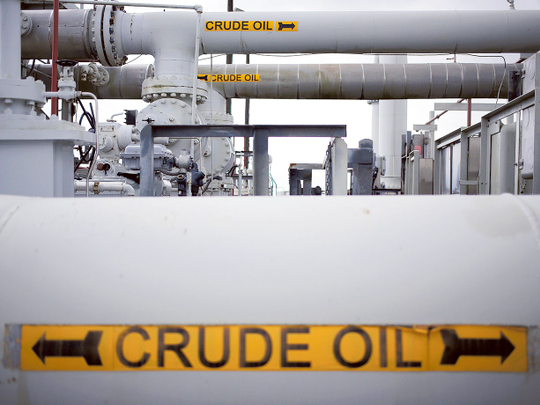
LONDON: Oil prices steadied on Monday as market participants better absorbed the shock of last week’s vote in Great Britain to leave the European Union and as analysts said Brexit would have a limited impact on global fuel demand.
Brent crude futures were up 17 cents at $48.58 a barrel by 0844 GMT. US crude was up 2 cents at $47.66 a barrel.
Both crude benchmarks closed down around 5 per cent on Friday amid plunging global financial markets as results from a referendum defied bookmakers’ odds to show a 52 per cent to 48 per cent victory for the campaign to take Britain out of the EU.
But prices recouped some losses on Monday as analysts said that Britain’s EU exit would have very little impact on physical oil trading.
“If we assume a 2 per cent drop in UK GDP in response to the exit vote, which is on the high end of our economists’ estimates, then UK oil demand would likely be reduced by 1 per cent or 16,000 barrels per day, which is a 0.016 per cent hit to global demand. This is extremely small on any measure.” said Goldman Sachs.
British finance minister George Osborne said Brexit was likely to lead to further volatility on financial markets but added that the world’s fifth-biggest economy would cope with the challenge ahead.
Of more concern to the market is a building refined products glut.
“For near term oil, we remain most concerned about product oversupply, China demand, the macro outlook, and the likely return of production,” Morgan Stanley said in a note to clients.
Chinese refiners have responded to the Asian oil products glut by exporting record amounts of gasoline and diesel fuel into regional markets, eroding refinery profit margins and swelling storage.
As a result, analysts said there is a possibility that refiners dial back production and curb orders for their main feedstock crude oil, potentially weighing on prices.
Morgan Stanley also said that the larger political and policy repercussions of a Brexit cannot be ignored.
“Europe is a big trading partner for the United States and China, which could lead to knock on global effects, and a stronger dollar is generally unhelpful for demand,” Morgan Stanley said.
“In a high stress case, our economists see global GDP slowing to 2.7 per cent in 2017 — nearly a global recession.”












